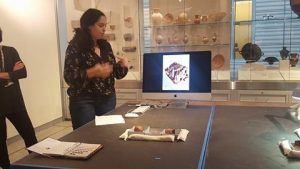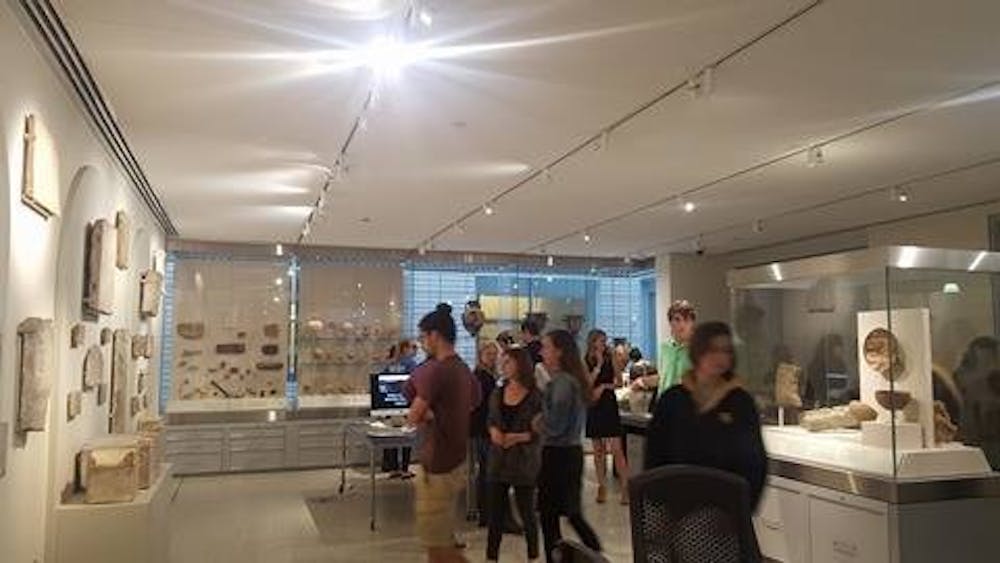Each summer, Hopkins archaeology students travel overseas to gain hands-on experience at excavation sites.
“What I Did on My Summer Excavation” showcased the dig experiences of three Hopkins archaeology students.
The event took place in the Archaeological Museum in Gilman Hall on Sept. 30. Attendees from Hopkins and local schools in Baltimore listened to the three students present on their summer excavation.
Junior Maddy Brancati, who worked on an excavation in Greece, spoke about how the department has a good reputation within academia.
“Within certain circles, it is reputable,” Brancati said. “I’ve gone and talked to other professors and colleagues, and they’re like ‘Wow, you go to Hopkins? Do you know this professor or this professor?”
The three students agreed that the archaeology curriculum at Hopkins provides excellent opportunities not just to learn archaeological theory, but also to practice the profession as well.
Senior Samantha Lindgren, who went to Israel, spoke about the strengths of the department.
“We have hands-on experience,” Lindgren said. “This is something that not all schools are given. I think that’s what makes our classes really unique.”
Archaeology is an inherently interdisciplinary field, and Lindgren believes that it is unique because it falls under both the humanities and the sciences.
“You can definitely be stronger in one area than the other, and it depends what you’re doing in it,” Lindgren said. “If you’re into multi-spectral imagery, that would be more on the science end. Ancient languages or art history interpretation would be more on the humanities end.”
Brancati presented first, elaborating on her experience in Greece over the summer.
“[The site was] a district capital and was occupied during the late bronze age,” she said. “The research there is really focused on state development in early Greece. You can study the relationship between emerging states and early Greece.”
She noted that not all excavations are as exciting as she expected.
“What I did was a lot of wheel barrowing and digging and shoveling, not really a lot of findings,” Brancati said. “But you can always find dirt.”

Lindgren spoke about her time in Israel. She spent her fourth season excavating the site of Ashkelon, which runs along the Mediterranean coast.
“I was involved in excavating a Philistine cemetery,” Lindgren said. “[It] was located north, and dates to the time of the Philistines, which was 3000 years ago. We excavated these tombs with a purpose of understanding burial practices and also learning about their lives and their deaths.”
Lindgren noted that her dig revealed traits of past societies, including the various social classes.
“These are two individuals we found in the last two years,” said Lindgren. “These are two of my favorites because the women contrast so much. This young woman, who’s about my age, was buried with no grave goods, whereas this woman was found with two bracelets, two rings, six earrings.”
Graduate student Morgan Moroney spoke about her experience digging in the northern Ethiopia.
“The annual rain there is what gives the Nile its annual flood. The river is well connected,” Moroney said. “We were... about an hour’s drive from Aksum, which is the ancient capital of the Aksum Kingon. It was a powerful kingdom of Africa in about 900 A.D. and was known to trade with Rome and in all sorts of places.”
Moroney emphasized the importance of leaving the site as it was before the excavation.
“After we finish our digs, we fill the trenches back up with dirt,” Moroney said. “We leave the site as it looked when we came.”
After the presentations, audience members were given time to ask the speakers questions.
When asked about obstacles during their excavations, the students agreed that legal issues often get in the way of continuing the digs.
“We had to keep this tarp over it because what we were doing was not publicized,” Lingren said. “Some groups don’t agree with the practice of excavating human remains. We had trouble with that in the past.”
Brancati elaborated on further difficulties, citing the time crunch that came with expired permits for trenches.
“The reason we were digging so much was that the permit for opening trenches had just expired,” Brancati said. “We were trying to open as many trenches as possible so we can prepare them for next season.”
Overall, the three students who presented at the museum chat agreed that the classes in the archaeology department provide an array of experiences for students.
“There are really cool classes offered,” Brancati said. “In Intro to Ceramics, we get to build a kiln and fire ceramics. So that’s an experience you don’t get anywhere but Hopkins. Our classes are very interactive, with presentations. We sometimes have object identification tests, where you show an image on the screen and you write something down.”
Undergraduates are often able to work with graduates for projects, which provides them with a more well-rounded experience.
“The professors really encourage us to be involved in graduate-level classes, so you’re not just limited to undergraduate resources,” Brancati said. “You can interact with graduate students and gain experiences. So that’s one thing I found helpful when I took a class last semester. It was great because we could work with grad students and learn what they’ve already done while also doing assignments assorted to our skill level.”
Lindgren further explained some of the projects she worked on with one of the department’s graduate students.
“He actually had us doing some projects that were his own side projects. He would give us all this data, and he wanted me to manipulate it this way to create a 3D reconstruction of a tower,” Lindgren said.
For students with an interest in archaeology, there are many ways to get involved on campus.
“There is the Johns Hopkins Archaeology and Ancient Civilizations Club,” Lindgren said. “We meet every other Monday and do a lot of different activities. We have professors come in and speak, and we’re going to try to get involved in a local dig.”
The students emphasized that archaeology does not necessarily have to be practiced on monumental sites overseas but can be practiced by anyone.
“I once did an excavation in Texas, actually, on my pasture, and found stuff from the ‘70s, such as old credit cards and toys, like historical archaeology,” Lindgren said.
Brancati thinks that what makes archaeology special is that it encompasses a broad range of materials.
“You can excavate trash too. We did that for Intro to Archaeology,” Brancati added. “Archaeology doesn’t just pertain to old things — it’s any material of culture you can learn something from.”





